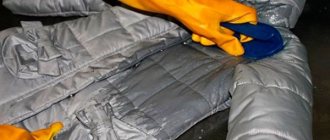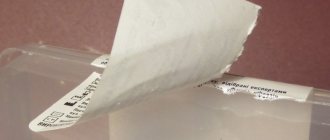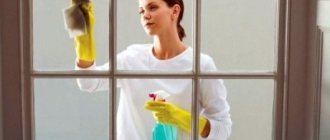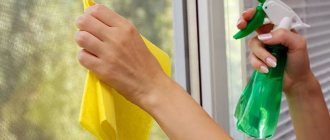Nowadays, a large number of people wear glasses, so the problem of caring for such an accessory is quite urgent. With improper care and cleaning, there is a high probability of damaging the glass or the fragile structure of the frame. And this can become a serious nuisance, since many people get very used to their glasses and then cannot find a suitable replacement for them for a long time. In this article we will describe how to clean glasses glasses at home and tell you what you need to do to protect them from scratches and breakages.
What are the cleaning nuances, depending on the material of the glasses?
Before you start cleaning your glasses, you need to remember that each material has its own rules and nuances of care. For example, what is an excellent way to care for glass lenses will cause irreparable harm to plastic lenses. Therefore, choose a cleaning method based on the materials from which the glass and frame are made.
Plastic is a material that is more susceptible to mechanical and chemical influences, so solutions for such lenses should be less aggressive in composition than those used to care for glass lenses.
So, what you need to remember when cleaning glasses with glass lenses:
- Glass itself is a stronger and stronger material, but it has less ductility and flexibility than plastic, and is therefore susceptible to crushing and cracking where excessive pressure is applied. Considering the high fragility of this material, cleaning should be carried out avoiding strong pressure when wiping and washing the glass.
- It is much more difficult to leave scratches on glass than on plastic, so when polishing glass glasses, you can use cloths with a rougher structure, which will allow you to quickly cope with the task.
- Specialized compositions for washing and polishing glass lenses have more aggressive components, since glass is more resistant to such chemical compounds.
Things to consider when cleaning plastic glasses:
- Plastic is not as stable a material as glass, so if not properly cared for, it can be damaged, leaving many scratches that cannot be repaired in the future.
- Do not use paper napkins, handkerchiefs or other improvised materials to wipe plastic glasses. All of them have a rather rough structure and can leave micro-scratches, which will subsequently lead to clouding of the glass.
- It is strictly forbidden to use solutions for other materials to wash plastic lenses, since plastic is delicate and does not tolerate the influence of more active chemical compounds.
How to clean lenses to avoid streaks?
First, it should be clarified that glass and window cleaners are not suitable for optical devices . They wash away ultraviolet protection and often contain substances that have a negative effect on lenses.
Next, we’ll go through the tools and ingredients that will help avoid streaks. Disposable specialized optical wipes are impregnated with compounds that prevent the formation of whitish deposits. However, you should not rely on sanitary napkins and options for wiping equipment screens . The former will not help in any way, and the latter do not have the necessary number of characteristics specifically for working with lenses. In other words, their properties are sufficient for high-quality cleaning of displays, but glasses glasses are more demanding.
All dry rags must be kept immaculately clean, not used for wiping non-optical devices, and washed promptly . Only strict adherence to all 3 described rules can become the basis for cleaning lenses without streaks.
Important! Microfiber cloths are washed every 2-3 lens cleanings. We are talking about a daily procedure.
You should also be concerned about the quality of the water used . Hard and containing a large amount of impurities will definitely leave a film. Moreover, the plastic support will also begin to accumulate whitish “prints” from contact with it over time. And it will be extremely difficult to remove them from the frame itself.
How to clean glasses
There are many different methods and devices you can use to clean your glasses, but keep in mind that each has its pros and cons. Before using them, you need to carefully study all the details in order to protect yourself from unpleasant moments.
Everyone chooses a method based on their personal preferences and financial capabilities (since some tools and materials can be quite expensive).
Professional glasses cleaning products and brief instructions on their correct use
Of course, specialized solutions for cleaning lenses are the safest and most effective. However, their cost can be quite high, and not all salons and optical stores can purchase them. When choosing such a product, you must first focus on the chemical composition, since low-quality solutions contain aggressive compounds that can harm glass.
You also need to check with the seller what material this product is intended for cleaning. This is important, because if you mistakenly apply glass lens cleaner to plastic ones, you can ruin them due to the fact that plastic glasses require more gentle and gentle compounds.
The method of application is similar for almost all liquids for glasses:
- Using a special dispenser, apply the product to the glass.
- Carefully and evenly distribute the solution over the surface.
- Using a special cloth, the lenses of the glasses are polished (do not press or apply too much pressure on them).
After these simple steps, the glasses are ready for further use. As you can see, cleaning your glasses using professional products will be quick, easy and effective. The main thing is to remember the rules for selecting the right product.
Can wet wipes be used to clean glass?
Experts do not recommend using regular wet wipes to wipe glasses. This is due to the fact that the liquid with which they are soaked, which is not intended for this purpose, will leave streaks. Of course, stains will significantly worsen your appearance, but this is not the worst thing. If the wipes contain a lot of coarse fibers, then they are likely to scratch the lenses (especially plastic ones).
In the assortment of specialized stores you can find wipes for optics that are impregnated with a special liquid intended for glass. This is very convenient, since such napkins will replace both professional liquid and soft cloths. This option is just right for those who especially value their time and comfort.
How to choose and how to use soft napkins correctly
Special soft microfiber cloths are now sold in any optical store, and in most cases they are immediately included in the set with glasses and a case. These wipes have proven themselves well among everyone who uses glasses.
They cope well with dirt, do not take up much space and are low cost. But in some cases, you will still need to additionally resort to the help of cleaning solutions if the wipes cannot cope on their own.
In addition to microfiber cloths, suede cloth napkins are also used. They help clean glass well, so which material to choose is up to everyone to decide for themselves.
How to clean glasses with soapy water
This method is quite common, since it is available to absolutely everyone and requires absolutely no costs. However, it will take a lot of time, since you need to prepare a soap solution yourself, clean the lenses, polish them, and then dry them for some more time.
If you do everything correctly, the results will please you, since soap can effectively dissolve any dirt and greasy stains that remain if you carelessly touch the glass with your fingers.
Preventing glasses from getting dirty quickly
To prevent excessively rapid formation of dirt on your glasses, it is recommended to follow several rules:
- Storage in a case, which should additionally contain a microfiber cloth. The case should be slightly larger than the glasses so as not to make it difficult to keep them inside. Otherwise, the model may be damaged.
- Putting on and taking off glasses according to certain rules. It is forbidden to touch the temples, bridge of the nose, or the lenses themselves. This will not only lead to contamination, but will also increase the risk of mechanical damage to the model. When installing and removing glasses, your fingers are placed on the top and bottom of one of the lenses.
- The use of special sprays, the function of which is to prevent stains on glasses when exposed to water, dirt, or fingerprints.
It is important to use these rules daily, then your glasses will be clean for a long time and will be better preserved.
How to properly clean glass at home
The most common and affordable way to clean glasses at home is to wash them in water using soap, shampoo or dishwashing detergent. Anyone can do this, and the result will be quite good.
So, below are step-by-step instructions for cleaning glasses, with which you can bring them into proper shape:
- Prepare a container with warm water (it is not advisable to use very cold or hot water, as this will have a bad effect on the condition of the glass).
- Using your thumb and forefinger, gently apply the soap to both sides of the lens, leaving no parts untouched. It is very important to wash your hands thoroughly before doing this to remove all dirt and oil from your skin.
- If there are any strong stains, then leave the soapy glasses for ten to fifteen minutes so that the dirt is sure to dissolve.
- Then you should rinse off all the foam with warm, clean water (preferably running).
- Gently shake off your glasses so that no drops of water remain on the lenses (they can leave cloudy spots when they dry).
- Place the glasses on a terry cloth or paper towel and wait until they are completely dry.
- If there are any smudges or streaks after drying, carefully polish the lenses with a soft cloth.
This procedure will not only improve the appearance, but will also kill all bacteria accumulated on the glasses. Therefore, it is important to wash your glasses several times a month, and more often if desired.
Recommendations from experts
If you want to protect your glasses from damage, you need to store them properly. It is recommended to choose for storage:
- soft case;
- a box of suitable sizes;
- separate drawer in the desk.
It is important to choose a place where the product will not be exposed to grease, dust or splashes of aggressive compounds.
For those who prefer to lead an active lifestyle, it is recommended to attach a rope or chain to the accessory.
To avoid staining the glass, when taking off your glasses, you need to hold them by the ears. If repairs are required, it is better to trust the professionals and contact an optician without trying to repair the product yourself. When scratches appear, you need to understand that they can impair your vision. You should not wear such glasses.
In order for the product to last longer, it is important to understand what means and items should absolutely not be used for cleaning. These include:
- handkerchief;
- ammonia;
- vinegar;
- bleach;
- glass cleaner;
- paper napkins with coarse fibers.
You can prevent lenses from fogging on frosty days or rainy weather using a special solution. To prepare the composition, you will need the following components:
- 7 parts colorless liquid soap;
- 3 parts glycerin;
- 5 drops of turpentine.
It is necessary to treat the glass with this product and then wipe it clean with a soft material. If you don’t want to spend time and effort preparing the composition, you can purchase a ready-made solution for cleaning glasses at one of the “optics”. There are now many drugs on sale that are made specifically for these purposes.
It is easy to cause great damage to plastic lenses when using perfume or styling your hair. Therefore, it is better to remove your glasses while using products such as:
- styling varnish;
- deodorant;
- perfume;
- hair conditioner.
It's best not to leave glasses in the kitchen or bathroom. It is advisable to avoid places where there is hot steam. A shelf with a toothbrush and shampoo is also not the best solution for storing glasses.
Ways to remove dirt from cracks
Over time, not only the glass itself becomes dirty, but also the frame. Particularly difficult to reach are the junctions between the lens and the frame.
Many people have a question - how to remove scratches from glass. This is especially true when the frame looks good, but small scratches appear on the lenses, spoiling the appearance of the glasses and impairing normal vision.
There are several ways to help remove scratches at home:
- The easiest way to remove minor defects is with toothpaste, which is found in absolutely every home. To do this, apply a small amount of paste to both glasses at once (take about one-fourth of the amount you usually use when brushing your teeth). Then carefully, using a soft cloth, begin to rub it from the center to the edges in a spiral. After the entire surface has been treated, rinse the glasses under warm running water. If once was not enough, then repeat the same thing again.
- You can also use regular soda, which is also available to everyone. You need to mix the dry powder with a small amount of warm, clean water (the consistency should be quite thick). And then, using the same circular movements, gently rub the resulting mass into the glasses.
It must be remembered that such manipulations can only be done with glasses that do not have a protective coating, as it can wear off or be significantly damaged.
How to properly clean the frame yourself
Step by step process:
- First, soak your glasses in warm water. Then take a toothbrush, tooth powder or toothpaste. Using your hands or a brush, spread the cleanser over the entire surface and brush off any dirt. Do not press too hard or make excessively intense movements, as this will damage the coating of the frame (especially if it is plastic).
- Then rinse everything off under running water.
- Place the glasses on a prepared clean towel or napkin and wait until completely dry.
- You can also clean the frame at the junction of the glass and the frame material using a toothbrush. It is not recommended to use needles or a sharp knife for this, as there is a high risk of damaging the lenses.
How to get rid of streaks on glasses
The most effective and fastest way to remove stains from glass is to polish the lenses with soft cloths.
This should only be done with cloths specially designed for this purpose. If dry wiping does not bring the desired results, then you need to first moisten the glasses with a special solution for washing lenses.
Why is it important to clean your glasses?
It's not just that glasses with stains on the lenses look unsightly and are hard to see through. Touch stains, dust, splashes, skin particles, plaque, cream residues, mascara - this is not a complete list of what can end up on glasses. Due to such contamination, the following consequences may occur: the eyepieces will lose transparency; objects will appear blurry; the contours of objects may acquire a rainbow rim; and spots with strange shapes will appear in front of your eyes. If you constantly look through lenses with spots, you risk not only exacerbating existing vision problems, but also developing strabismus.
What to use to clean glasses:
- Spray cleaners - specialized sprays and liquids are gentle on optical devices. They remove all organic and inorganic contaminants from the lenses, while their contact with the plastic frame does not lead to the formation of a film. Most of them, in addition to their main function, also have an auxiliary option, for example, antistatic or can additionally prevent fogging. This is a pressing problem that arises when there is a sharp change in temperature; a clear example of this is when entering a warm room from a winter street. Lenses treated with the solution are much less susceptible to fogging.
Important!
Plastic lens sprays will not affect glass lenses, but glass cleaner may damage the plastic.
- Microfiber cloths are best for removing dust, fingerprints and other contaminants from the juices. This material is soft enough and does not leave scratches on surfaces. These wipes can be used to clean both glass and plastic glasses. An alternative to microfiber wipes are suede wipes, which are suitable for removing dirt from glasses with glass lenses. You need to wipe in the right direction: from the temple to the nose. Wipe the center edge of the frame and the bridge of your nose last - they may leave marks due to constant contact with the skin.
- Wet wipes—you can clean your glasses with wet wipes, but only those that are specifically designed for this purpose. To find exactly these, you should go to a specialized store or optician for them. A huge advantage of using wet wipes is the fact that they contain antibacterial substances that will not only clean your glasses of dust and dirt, but also eliminate germs and bacteria. But there is also a disadvantage of this method - divorces.
- Warm soapy water - When using water to clean lenses, it is recommended to follow the procedure in the following order:
1. Add a small amount of non-aggressive liquid detergent to a container with warm water; 2. Wash the glass thoroughly on both sides using a soft cloth. 3. Leave the glasses for a few minutes so that the water runs out and their surface dries out a little. 4. Wipe the product well with a clean, dry microfiber or flannel cloth. 5. After these manipulations, it is recommended to hold the glasses up to the light and make sure that the surface is clear of stains and streaks.
Important!
It is recommended to buy sprays and cleaning liquids in specialized stores. There are a lot of low-quality products on sale that contain substances that cannot be used to wipe lenses (for example, abrasives and alcohols).
Remove dirt from hard-to-reach areas of glasses
The design of the glasses is such that dust and dirt accumulate in different parts of them especially often. You need to get rid of it periodically. To do this you will need cotton swabs or toothpicks. After removing dirt from the crevices, rinse your glasses in warm running water and dry them naturally.
How to properly dry and check the results of cleaning glasses
To dry your glasses after cleaning them, place them on a prepared towel or thick paper napkin so that the glasses do not touch the fabric or paper. If there is a lot of water left on the glass, before doing this, carefully shake it off several times to remove all droplets and streaks. You cannot actively wipe them, as streaks and stains will remain.
If you don't have time to let your glasses dry on their own, then it is recommended to take a microfiber cloth and polish them well. The effect will be slightly worse, but this method is also allowed to be used.
In order to check the results of washing your glasses, you need to carefully examine them in bright light (preferably natural, not artificial). At the same time, tilt them so that you can see the glass from all angles. Lenses must be completely transparent. If stains are found, carefully remove them with a soft cloth.
How to dry glasses correctly?
Useful notes and recommendations:
- If the glasses were washed under water, be sure to shake them off, and only then proceed to dry them with a microfiber cloth.
- When working with rags, do not move randomly. Move in one direction.
- Don't use too much force. Movements should be light and circular.
- First, the glass is wiped, then the nose pads, and then the frames and temples themselves.
- The decorative elements of the frame and the fasteners connecting the temples can accumulate moisture and it will not be possible to dry them by simply wiping them with a rag. Therefore, it makes sense to let the glasses sit for a while after washing . If you do this, you will be able to preserve the original consumer properties of your optics longer.
Crochet openwork booties
How to properly place shoes in the hallway
What cleaning methods and means should not be used?
There are several mistakes that you should not make when cleaning your glasses, as this will ruin or significantly damage them. So, let's figure out what should not be used when caring for glasses:
- Cloth. Very often, the edge of a blouse or shirt is used to wipe glasses. This is fundamentally wrong, because the fabric can be too rough and will contribute to the appearance of abrasions and scratches. In addition, clothes can be dirty, which will only worsen the situation.
- Ordinary rags and shreds. They are not suitable for washing and wiping glasses, as they contain coarse threads, which, when in contact with lenses (especially plastic ones), will leave a lot of scratches, which then cannot be removed.
- Alcohol. Alcohol will damage the protective coating of glasses and is generally too aggressive a chemical compound.
- Vinegar. Vinegar is a strong acid that will damage lenses, so it is dangerous to use.
- Liquid for washing glass and mirrors. The composition of these solutions is not intended for cleaning such delicate surfaces as glasses. For plastic lenses, the use of these solutions will be fatal.
Anti-fog sprays for glasses
They are special liquids for cleaning optics, including glasses. These sprays contain components that ensure thorough cleaning of glass without streaks. Some liquids have antistatic, antifog and even disinfectant properties. Similar products are produced by (Good Look Antifog), Bentus Laboratories (Sanitelle). These sprays are used as follows: apply it to the entire surface of the glass and wipe gently with a special cloth. This will remove all contaminants. To protect your glasses from fogging, simply spray the lens spray and leave until completely dry.
How to carry out preventive care for glasses (when to wipe glasses, where and how to store them)
So, in order for your favorite glasses to last a long time, it is not enough to clean them occasionally (even if they are cleaned according to all the rules). To increase the service life of your glasses, you need to store them correctly and handle them carefully every day.
Rules that will help maintain the appearance of your glasses for as long as possible:
- Make it a habit to always put your glasses in a special case or storage bag. This will prevent scratches and damage when you carry your glasses in a bag or store them in a drawer with other things.
- Never place glasses with the lenses facing down, as this can cause significant damage to them, especially if you do this constantly. This simple tip will help protect your glass from many scratches and damage.
- Buy a special cloth for wiping glasses and use it only for this purpose.
- Never wipe glass with your fingers or try to remove dirt with your nails.
- Try not to touch the glass with your fingers, as this will leave traces of sebum on the glasses. Ultimately, this leads to the fact that you will have to wipe and wash your glasses much more often, which will contribute to their faster wear.
- For people whose glasses often fall, hit or break, purchasing a special chain for glasses may be a good recommendation.
- Periodically tighten all the screws in the fasteners to prevent them from becoming loose. If the fastenings are loose, it is more likely that dirt will accumulate in these places, which will then be difficult to clean out.
See this life hack on how to clean your glasses without streaks:
Plastic lenses
Plastic lenses are different from glass lenses. They have their advantages and disadvantages, as well as differences in cleaning methods. If you do not take this into account, it is easy to ruin an expensive item.
See also
30 best products for cleaning mirrors at home without streaks
Advantage of plastic lenses
The advantages of plastic lenses over glass include:
- safety;
- ease;
- comfort to wear;
- a variety of shapes and shades, which allows you to highlight your individuality.
Breathe and wipe
Unlike glass lenses, plastic ones are easier to clean from dirt and greasy marks. To polish your glasses without streaks, simply breathe on their surface and then wipe with a soft cloth.
What not to use for cleaning
For cleaning plastic products it is not recommended to use:
- acids;
- alkali;
- caustic compounds;
- ammonia based solutions.
Caustic chemicals
They corrode the protective layer, reducing all its characteristics to nothing. Refrain from using such connections if you do not want to ruin your favorite accessory.
Acids
Acids are no less aggressive to the protective layer, plus they can damage the plastic itself. Applying acid to plastic lenses is not the best way to deal with dirt.
Ammonia solutions
Ammonia-based solutions are not suitable for sensitive protective film that protects the eyes from exposure to ultraviolet rays. Under their influence, the protection is destroyed, and the eyes suffer more than usual.
Alkali
The use of alkali, as well as other potent reagents, negatively affects the condition of the lenses. You will clean the dirt, but the protective layer will also be removed along with it. Most likely, this will not be the result that the owner of the glasses wants to achieve.
Soap solution or mild detergent
It is best to wash plastic lenses with a soap solution, which effectively copes with the tasks without damaging the surface of the material. In extreme cases, in case of particularly severe contamination, it is allowed to use a mild detergent diluted in warm water.
Getting the frame in order
It is on the frames and nose pads that more bacteria, grease and dirt accumulate.
You can also clean them with a soapy solution, as used for cleaning glass (warm water, baby or liquid soap, dish gel or shampoo). Use a soft cloth soaked in the prepared liquid to treat the surface.
When green appears on the frame, it is worth replacing it with a new one. But, if you have experience and opportunity, you can unscrew the nose pads with a small screwdriver. Next, soak a cloth or soft-bristled toothbrush in soapy water and scrub the frame. To remove dirt from hard-to-reach places, you should use cotton swabs.
Glasses require proper and regular care. It is recommended to clean them once a day, paying attention not only to the glasses, but to the nose pads and frames. It is better to store glasses in a hard case, this will protect them from rapid contamination.
Preparing for cleaning
Before you begin cleaning your glasses, you must:
wash your hands: perform all manipulations only with clean hands. You should wash them thoroughly under warm water and soap (without lotion) to prevent grease, oil stains, dirt and dust particles from getting on the surface of the glasses. Then dry with a lint-free towel;- Prepare the necessary materials for work: soft cloth, cleaning agents (homemade or professional), and, if necessary, a container.
About professional products
What to look for when choosing a cleaning liquid or spray:
- On the composition. It should be gentle, without aggressive components.
- Purpose. What kind of lenses is the product intended for cleaning: glass or plastic?
Use specialized products according to instructions. Approximate algorithm: apply the cleaner to the glass using a dispenser. Using a microfiber cloth purchased from an optician, gently rub the lenses without pressing. Greasy marks and stains will be removed without a trace.
As a rule, such products, in addition to cleaning properties, are endowed with one or more additional ones: the formation of a protective film, which significantly reduces the risk of scratches and “prevents” repeated rapid contamination, providing an antistatic effect, increasing the level of lens fogging resistance.
An alternative to liquids, sprays and microfiber are optical wipes with special impregnation . They are easy to use: dries instantly without streaks. There are universal ones that are suitable for cleaning both eyeglasses and sunglasses, as well as for smartphone screens, etc. Studying the instructions is mandatory; there may be restrictions on use, for example, for sunglasses with acrylic lenses.
Napkins
On sale you can find a large variety of wipes for cleaning glasses. All of them are divided into two main types: reusable and disposable.
Reusable
Typically, reusable wipes are made of microfiber. This material perfectly removes any dirt and leaves no streaks. These wipes can be used without special liquid cleaners, making them easy to use. To store them, you must use a special case, and when they become dirty, they must be washed.
Disposable
The cost of disposable napkins is slightly higher than reusable ones. However, they differ in a number of advantages:
- No need for regular washing.
- Many disposable wipes are impregnated with special antibacterial solutions.











